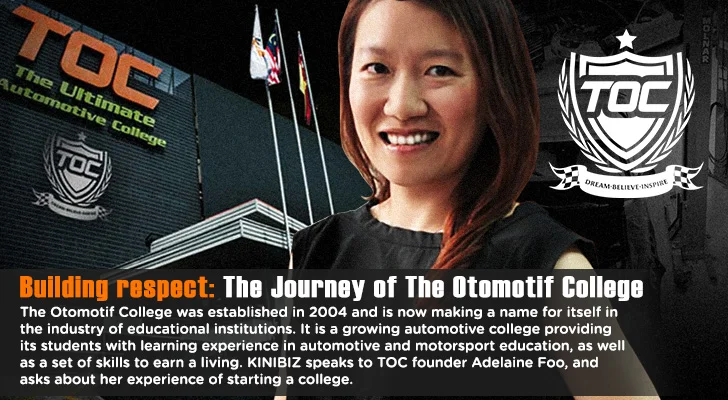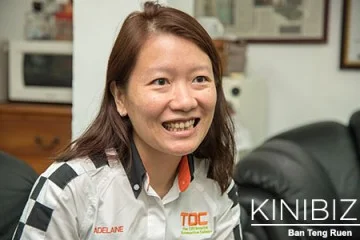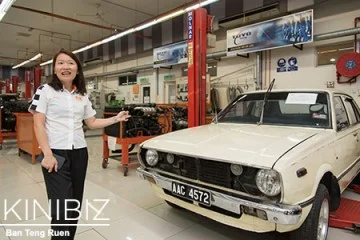The Otomotif College: A fresh beginning
Source: KINIBIZ Online
The Otomotif College is a growing automotive college which offers diplomas in motorsport technology and automotive technology and more. Here, Adelaine Foo, founder of TOC, speaks to KINIBIZ on her journey in starting TOC, and just how the college came to understand its importance in the lives of its students.
In the beginning, Adelaine Foo, founder of The Otomotif College (TOC), had a staff of five, including herself.It was fun at the time. Everyone had to multitask. I was making the coffee, signing the pay cheques, checking the accounts. All of us had to do a few things at the same time,reminisced Foo as she told KINIBIZ about how things were at the beginning when TOC opened its doors on Jan 1, 2004.
According to Foo, TOC was started after a year and a half of market research, where the original shareholders found that there was space in the market for an educational institution for mechanics.
According to Foo, the idea to start the college came about after seeing that there were many cars on the road, care required for these cars and the human resource needed. This is basically the skilled manpower needed to take care of vehicles, which the shareholders thought it seemed like a good business opening opportunity.
We began our market research in 2002, to find out if the idea was viable, and made our college licence application to the government in 2003. We also got the lease for the initial TOC campus, which was an industrial space near the Federal Highway, in 2003, explained Foo.
Foo met the other two shareholders, Wan Kamarul Zaman Yaacob and Abdul Hamid Mohamed, both of whom are old friends of her parents, back when she was looking for business partners to start the college.
Source: KINIBIZ Online
My parents were from the media and entertainment industry, and they, as well as their friends who are the shareholders for TOC, did not have backgrounds in either the automotive industry or the education industry,explained Foo, who has a Bachelor’s Degree in East Asian Studies and a Masters Degree in Chinese Opera.
Upon hearing this, KINIBIZ just had to ask: Was the transition from arts to business a shock?
Foo answered by saying the learning curve was difficult and that it had taken some time to learn and adapt to the situation.
But when you get thrown in the pool, the only thing to do is swim, right? said Foo.
With the help of Wan Kamarul Zaman and Abdul Hamid, who were introduced to her by her parents and who were also interested in the idea of an automotive college, a sum of RM5 million was pooled to be utilised as capital to kick start the college.
Of the RM5 million, RM1 million was used as a renovation fund for the industrial space, as well as to procure the fixtures that an automotive college would need. A further RM1 million went towards acquiring training implements for the college, such as training vehicles, tools, and other material. In addition, Foo recounted that the rent for the industrial space came up to over RM20,000 a month, which came from the remainder of the fund.
In the beginning, I didn't know anything about automotive or education,said Foo, adding that the college had just opened for business like a shop. Foo explained that due to their inexperience in the market, TOC only managed to pull in its first batch of students in October 2004.
According to Foo, this first batch was part of a scholarship programme under Toyota, with the carmaker offering a scholarship for 10 applicants from around the country. TOC had posted ads nationwide, and exactly 10 applicants responded.
We were slightly concerned about how we were going to go about the selection process, and mentally preparing ourselves for that, reminisced Foo.
Source: KINIBIZ Online
A rough start
Now hang on. The first batch of students the college saw was in October? Almost 10 months after the college opened? KINIBIZ thought that this seemed a rather significant and concern-raising amount of time, and enquired about how Foo was feeling throughout this time.
It was a very worrying time. I lost quite a bit of sleep during that time. I mean, its not my money, but the shareholders… If it were mine, I think I might have given up after a few months, confessed Foo, who added that the next step was to solve the problem, and figure out what was wrong, as well as how to fix the problem.
At that point, according to Foo, the goal was to survive. TOC rented out some of its space to other businesses, washed cars, and, as Foo said, did anything that generated income for the college and kept the college afloat.
It was survival taking over, said Foo.
After that initial batch of 10, as well as a second batch of 50 students that went through the course under the banner of local carmaker Proton, students started to enroll in the courses that the college had to offer.
It was like, after the first two catalyst batches, people realised that taking up a course in automotive actually had a future, said Foo, adding that now, almost 100% of the students in the colleges care were self-funded.
She added that the college started seeing higher enrolment numbers in intakes, of which there were five every year. These intakes are the February intake, coinciding with the end of the Chinese New Year; the April intake, which is historically its largest due to the time being the release of the Sijil Pelajaran Malaysia results; the June/July intake; the August/September intake; and the November intake, which is when the college sees most of its new international students.
Source: KINIBIZ Online
So what kept you going?
Part of the motivation in keeping the college going right now revolves around the attitude that people tend to take towards their technicians, according to Foo.
When we go to a hospital, we address the nurse as miss. Its rare that anyone will drive into a workshop and address the technician as mister. It does not help that people also have the idea that being a technician is a path for those who have not done well in their studies,said Foo.
When we look at accountants, architects, and lawyers, we respect them, and we respect their professions. But what about technicians? We need their expertise as well, and they are definitely deserving of the same respect,” Foo added.
This, according to Foo, is part of the vision that drives the college now. Personally, she sees the college as having matured from a business, to make an impact on the lives of members of society, especially those of the students under the care of the college.
At the same time, Foo recognised that the challenge right now is to sustain and grow.
Before this (during the nine months when the college had no students), if I were to close down, it would have been all right, in that I had no students. But now that I have about 1,500 students out there with TOC degrees, I cant just close the college; the name and credibility of the college is what makes those degrees be of worth. If I close down, I would be abandoning those students that have already graduated, and I cant do that,said Foo.
Source: KINIBIZ Online
Trials and rewards
At this point, KINIBIZ wondered, if the college now represented a cause more than a business, what would be the greatest reward, as well as the greatest challenge, that has been seen by Foo and TOC?
For Foo, the greatest reward is the graduation ceremony that is held every year.
We get more and more students graduating every year, and every year, while we only have the one convocation, there will be family members of our students who come to us to say thank you, explained Foo. At the same time, we are changing their lives, and allowing them to study something, and earn their livings from something that they are passionate about.
In terms of the greatest challenge, Foo noted that the challenge will always be relative to the company stage of growth at the time.
Challenges faced in business are like challenges faced when growing up. What we may see as a big problem when we were younger may not be as big a problem when we get older.
“However, there will be another challenge to be faced then. As a baby, the challenge is to walk and talk, then as a child, it is learning and studying. In this way, the college has had to face the challenge of survival, and now it faces the challenge of sustaining its brand, as well as growing, said Foo.
KINIBIZ talks to Adelaine Foo about TOC plans moving forward, as well as the college current expansion into Australia in the next article.
Article source: KINIBIZ Online by XAVIER KONG





